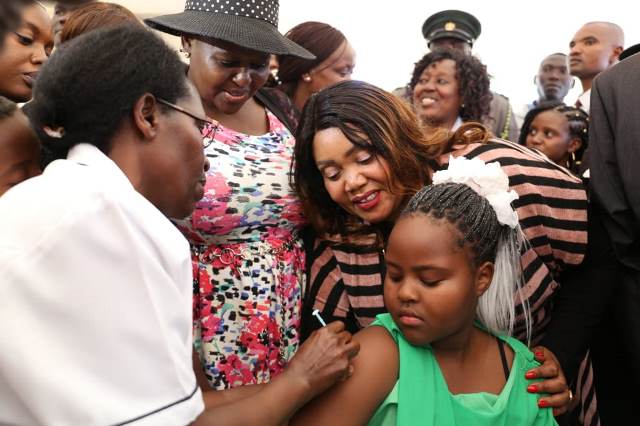Covid-19 Impedes Kenya’s Cervical Cancer Vaccination Campaign
As Kenya battles the Covid-19 pandemic, the concern is rising over the low numbers of girls getting vaccinated against cervical cancer, due to the official update on the programme that reveals that 400,000 girls aged 10 missed out on the first phase of the exercise.
“Of the 800,000 girls targeted to be vaccinated within one year of introduction, 359,000 have so far been reached so far,” acting Health Services Director-General Patrick Amoth says in the “Status Brief on HPV Vaccine Implementation as at July 9, 2020”.
The government kick-started the cervical cancer immunization programme on October 18, 2019.
Speaking at the inception of the exercise in Mombasa County, the then Health Cabinet Secretary Sicily Kariuki said the vaccine would become part of the country’s routine vaccination programme.
“Cervical cancer is the leading cause of death among female reproductive cancers in Kenya. Partnering with Gavi, Unicef, and WHO in introducing the HPV vaccine into our routine immunization programme is a crucial step forward in boosting the health and long-term prosperity of the Kenyan people,” she said.
Since the Covid-19 pandemic forced the shutdown of schools, however, targets have not been met, one of the causes being the fear of visiting facilities among Kenyans.
Dr. Amoth however, reassured the public that the services are still being provided at public health facilities.
“Approximately 9,000 private, public and faith-based health facilities provide the HPV vaccine free of charge and they are working together with 35,000 primary schools,” Dr. Amoth said in the brief statement to the media.
The programme, according to him, has proven success but the pandemic slowed efforts to ensure as many girls as possible are protected from cervical cancer.
“Public response has been immense, with a high demand for the vaccine. However, during the school holidays in December, fewer girls were reached. The pandemic has further compounded this situation,” he said.
The medic, who doubles as the Vice President of the Executive Board of the World Health Organization (WHO), attributed the slowdown in vaccination uptake to the closure of schools to protect learners from the virus.
“The closure of schools for the December holidays, and subsequently due to Covid-19 concerns, reduced the momentum for vaccination, given that the strategy strongly involved targeted outreaches in schools,” he said.
In addition, he said the limitations the government set on how many people should meet also hampered the program.
The extent
For continued service delivery, the director-general said the ministry is engaged in virtual meetings with county governments and other partners to mobilize communities and normalize the process.
Dr. Amoth also added that the ministry has enough vaccines for a year.
“No serious shortages have been reported across the country since introduction. No reports have been issued onstock-outs at any level,” he said.
Globocan’s 2018 estimates reveal that nine women die of cancer every day in Kenya. The human papillomavirus is the main cause of cervical cancer, which is leading cancer in Kenyan women between the ages of 15 and 44.
There are over 100 types of HPV and at least 14 are known to cause cancer.
According to the WHO, types 16 and 18 are mostly responsible for 70 percent of cervical cancer cases.
An estimated 5,250 cases are diagnosed in the country every year, with 3,280 dying of the preventable disease annually.
According to the Global Alliance for Vaccines and Immunisations (Gavi), safe and effective HPV vaccines can prevent up to 90 percent of all cervical cancer cases.
The outcome
Ms. Benda Kithaka, the head of the Women4Cancer Early Detection and Treatment Advocacy and Cancer Care Group, warned that cancer will not be effectively managed in Kenya if the pandemic is not controlled on time.
“We are concerned that the pandemic will have an adverse long term effect on the cervical cancer management program. If the cases continue to increase, the government will be forced to allocate more health funding to control the spread,” said the anti-cancer activist.
Ms. Kithaka also urged women to take their daughters to public health facilities for the vaccine.
“The vaccine is free in public health facilities. Women need to take their daughters there for immunization,” she said.
Ms. Ann Mbogori, Karen Rotary Club’s President, said the charitable organization is running an advocacy campaign to get girls vaccinated.
Ms. Mbogori said the plans were part of the Rotarians’ commitment to increasing cervical awareness and encouraging women to go for treatment if diagnosed with the condition.
“We are working with partners in promoting the HPV immunization program for our daughters,” she said.
Dr. Josephine Mbae, the Nairobi Chief Health Officer, Dr. Josephine Mbae, the Nairobi Metropolitan Services included the vaccine in campaigns between June 18 and 19. They took the campaigns in Nairobi county areas such as Mathare, Kamunkuji, Dagoretti, Kibra, Langata, Kasarani, Starehe, Kariokor, Embakasi North and Dandora.
“The vaccination is ongoing in maternal and child health (MCH) facilities in all our sub-counties as part of routine immunization. We aim to reach 30,000 girls in the first phase,” said Dr. Mbae.
“The elephant in the room is low turnout. This arises due to misinformation more so from the faith-based communities,” she added.
To solve this problem, the county health department is engaging religious leaders on the importance of protecting girls from infection.



Comments are closed.